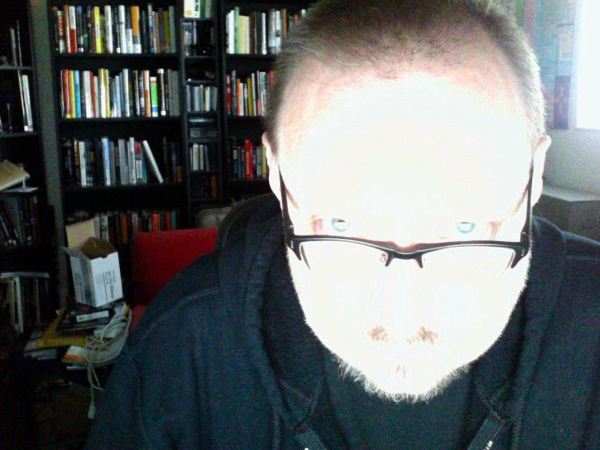Another One Down, Ninety More to Go
And so 2010 draws to a close.
I managed only fifty posts this year, a side-effect of having spent so much time traveling, preparing to travel, or recovering from travel. I ended up spending about three months out of the country this year, mostly in five to seven day increments. It gets tiring, and one of my resolutions for 2011 is to travel less. We'll see how well I do with this decision.
2010 felt a bit like a pause year, at least in comparison to the media frenzy of 2009. I need to get back in the game next year; the brutal reality of a freelancer's life is that (as I've been told) invisibility is death.
I did manage to come up with some good ideas and essays this year, even if they were sporadic.
My favorite "fun" piece was my essay on Augmented Fashion Reality for Fast Company:
I remember the first time I saw an AR outfit. I did a double-take, because I could have sworn that the woman had been wearing a fairly bland dress when I saw her at a distance, but suddenly she was wearing a sparkling gown that I could swear was made of diamonds. A few minutes later, I took off my arglasses to get something out of my eye, and *poof* her dress was back to the simple beige shift. That bland outfit was actually carrying a half-dozen or so specialized smart tags, providing abundant 3D data that my arglasses--and the AR systems of everyone else around her--translated into that diamond dress.
A bit more substantial was my piece "Your Posthumanism is Boring Me" for io9:
What happened with Louise Brown and IVF will be replicated across the spectrum of technologies that we now celebrate or decry as leading to our posthuman future (the title, by the way, of conservative social critic Frank Fukuyama's book on how the technologies of human augmentation will lead to the collapse of society). Fear is replaced by familiarity. And unlike IVF, the spread of the Internet and easy communication will mean that most of us will have heard about these technologies as they develop. By the time they arrive, they'll already be boring.
My most practical offering was the three-part series on how to create scenarios, again for Fast Company:
Foresight exercises that result in a single future story are rarely as useful as they appear, because we can't predict the future. The goal of futures thinking isn't to make predictions; the goal is to look for surprising implications. By crafting multiple futures (each focused on your core dilemma), you can look at your issues from differing perspectives, and try to dig out what happens when critical drivers collide in various ways.Whatever you come up with, you'll be wrong. The future that does eventually emerge will almost certainly not look like the scenarios you construct. However, it's possible to be wrong in useful ways--good scenarios will trigger minor epiphanies (what more traditional consultants usually call "aha!" moments), giving you clues about what to keep an eye out for that you otherwise would have missed.
My most informative piece was apparently my explanation of just what the Ventner team had and had not accomplished with its synthetic genome, "Give My Creation... Life!":
"Synthetic" here doesn't mean artificial, by the way. The DNA of the synthetic genome comprises the same base pairs and nucleotides as a natural genome, but was synthesized in the lab rather than replicated from an earlier cell. The best analogy I can think of is if, rather than copying the MP3 of your favorite song, you pulled together a really sophisticated music creation application and reproduced the song yourself, exact in every detail. It's the same, but a synthetic version.If that sounds like a lot of work to get something that is essentially the same as the natural/original version, you're right. But this step was never the real goal -- it's just preparation. The real goal is to create an entirely novel life form, comprising both entirely new DNA and an entirely new cell. That's still to come.
The piece that will probably have the most lasting impact, though, is Neodicy:
The practice of foresight needs within its philosophical underpinnings a similar discourse that treats the fear of dangerous outcomes as a real and meaningful concern, one that can neither be waved away as pessimism nor treated as the sole truth — a "neodicy," if you will. Neodicies would grapple with the very real question of how we can justifiably believe in better futures while still acknowledging the risks that will inevitably arise as our futures unfold. Such a discourse may even allow the rehabilitation of the concept of progress, the idea that as a civilization we do learn from our mistakes, and have the capacity to make our futures better than our past.
And, of course, Worldchanging saw its final days:
We weren’t the only ones who saw the zeitgeist, but for a time we were the ones who had figured out how to say what needed to be said in ways that people wanted to hear. The language and the arguments we used went quickly from being niche perspectives to being cornerstone ideas of a new (or revitalized, take your pick) view of a sustainable, resilient, desirable world. Over time, with great effort and generous contributions of time and money from hundreds of people, we fought our revolution... and won.
May your futures always be better than your past. See you next year.


 It seemed a little thing, at first.
It seemed a little thing, at first.


